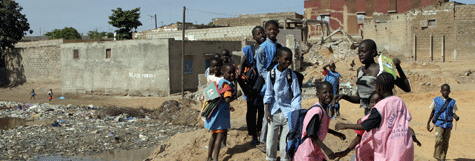
Determinants of Vulnerability and Resilience
NCCR North-South Research on vulnerability and resilience focuses on diagnosing deficiencies in existing environmental sanitation services and identifying the ways in which people cope with those deficiencies. A central aspect of this research lies in determining the priorities of the users for improvements in environmental sanitation services. Within this context, sensitivity to the role of gender in establishing priorities is of fundamental importance.
Research is conducted using a combination of established scientific disciplines - from epidemiology to medical anthropology and environmental engineering - along with knowledge obtained from local household and institutional experience. A strong emphasis is placed on finding ways to bridge the gap between innovative scientific research and the realities of practical application in the field. Case studies are conducted in
Southeast Asia (Thailand and
Vietnam) and
West Africa (Mauritania,
Côte d’Ivoire and
Chad).
One of the more innovative aspects of NCCR North-South research on vulnerability and resilience is the development of an expanded concept of public health, whereby animal health is integrated into a "one-health" approach to improving human resilience to disease. While this concept is of particular importance in pastoral communities, it can also be applied in other rural and semi-urban contexts where cost-effectiveness can contribute substantially to poverty alleviation. Experimental projects testing the usefulness of this approach, specifically in dealing with bovine tuberculosis, have been conducted in
Central Asia, the Sahel, and Ethiopia.
CONTACT
Jakob Zinsstag
Swiss Tropical Institute (STI), Switzerland